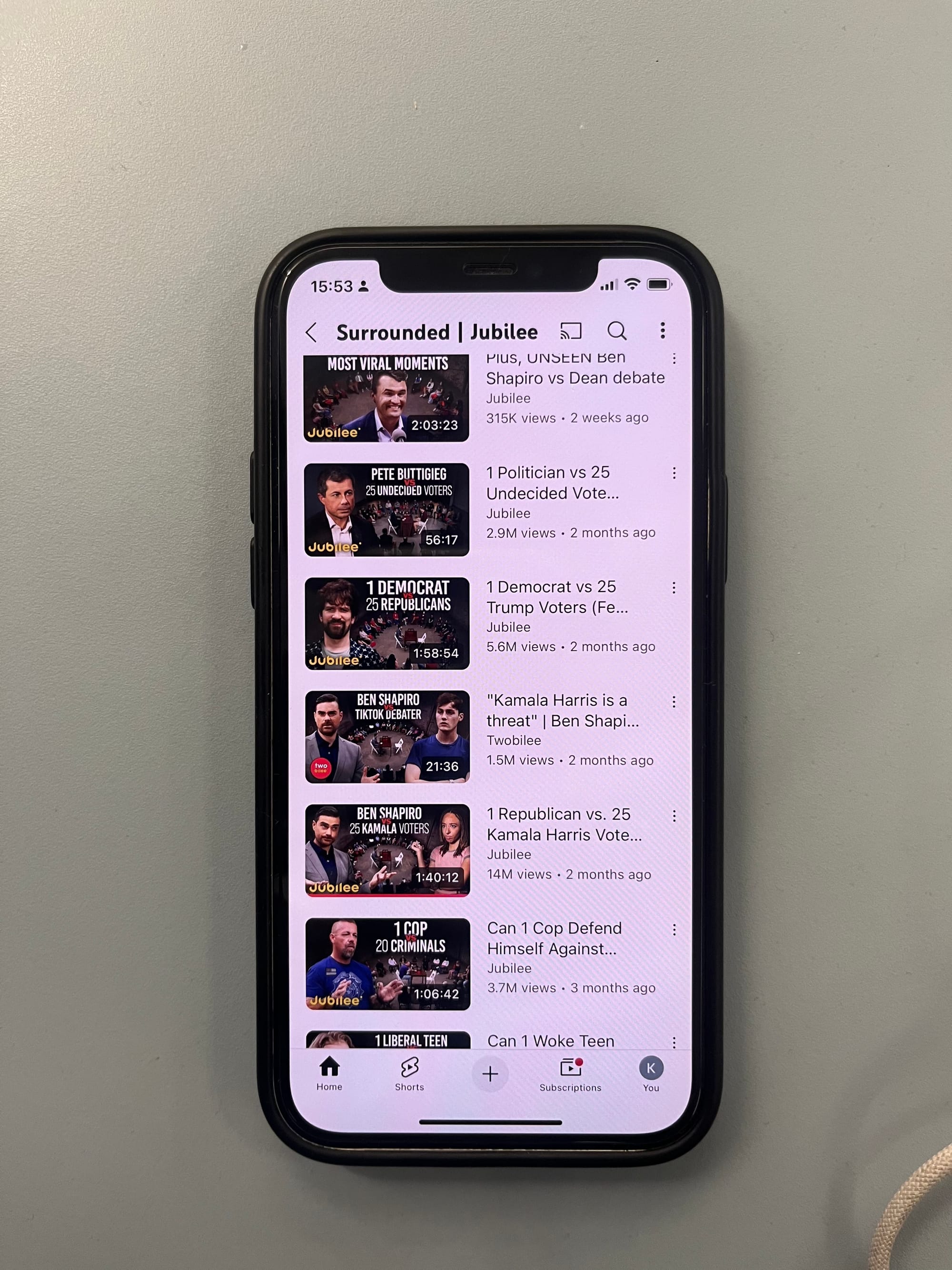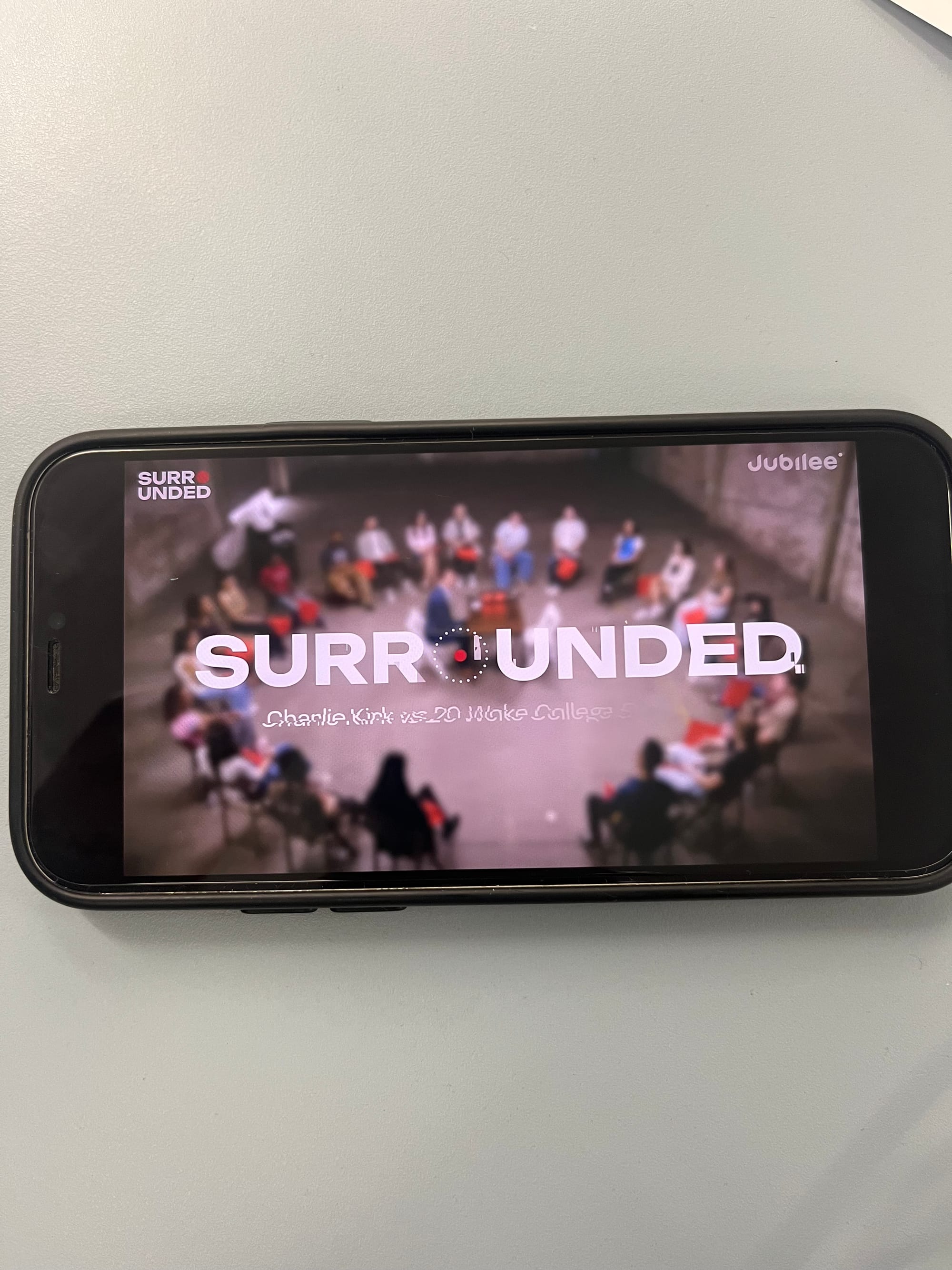By Epigram
Political content on platforms like YouTube and TikTok is increasingly centred around debates. We are constantly being invited to watch Ben Shapiro ‘destroy’ woke college kids, or are being asked if a woke teen can ‘survive’ 20 trump supporters. These debates offer explosive attacks and witty quips, making them valuable sources for viral moments. But we are left questioning what these videos actually achieve.
In the lead up to the US election, Jubilee released a series of videos titled ‘surrounded’, in which one person debates 20-25 others who hold a supposedly opposite political view. They have 20 minutes to debate each statement, where one of the 20-25 opposition participants will debate the single person in the middle until they are ‘voted out’ by the others. Following this, another one of the 20-25 will get their opportunity to debate. The set up is more like a gameshow than an academic debate, with the quickfire rounds and the constant cycling of the opposition leaving little scope for the debaters to attempt to understand each other’s views. Instead, it becomes a game of who can shut down the other person most effectively with a strong one liner. More time seems to be spent talking over one another in these debates than attempting to respond to what the other person has actually said.

The three most viewed videos from this series were titled, ‘Can 25 Liberal College Students Outsmart 1 Conservative?’, ‘Can 1 Woke Teen Survive 20 Trump Supporters’, and ‘1 Republican vs. 25 Kamala Harris Voters’. Immediately we can see where the lines of ideological division are drawn- liberal vs. conservative, left vs. right. In the US, where the political system is effectively reduced to two parties, it makes sense that the media focuses so heavily these opposing sides. Though, as these debates wore on, it increasingly felt as though this ideological polarisation is reductive and, to an extent, arbitrary.
With the liberal vs. conservative, or left vs. right line too harshly drawn, the debaters seem to put their ideological allegiances above what they really believe. What I mean by that is opinions on issues are categorised as left or right wing, when in fact people from either side would be inclined to have a more nuanced opinion were they not confined to these two opposing wings. I realised this during the ‘Can 25 Liberal College Students Outsmart 1 Conservative?’ video, where they debate the statement ‘College is a scam’. Charlie Kirk, representing the right wing, takes the stance that it is, and the 25 liberals staunchly defended every aspect of the US college system. Of course, the statement is designed to be reductive and inflammatory. But what struck me is that aside from Parker, the final debater, all the other liberals were unable to admit that college, in some ways, may not be giving students their money’s worth. Especially with the extortionate fees associated with the American college system, it is not unreasonable nor unliberal to suggest that this system does function as a bit of a scam for some students. The fast-paced, oppositional, and competitive setup of the video did not leave scope for these realisations and reflections to be made. Who cares about nuance? We want to see them fight!

Similarly, Charlie Kirk pushed the narrative that the number of people that end up in jobs that do not require a college degree is hard evidence that college is a scam. He is unwilling and unable to admit that although the degree was not required, it may still have benefitted those people in the workplace and may have assisted them in getting the job. I believe that in a less oppositional and aggressive environment, both sides would have been able to find more nuance, and more common ground, within their viewpoints.
In the same video, they debated the statement, ‘Abortion is murder and should be legal’. In a moment that went viral, the liberal debater asked Kirk if he would allow an abortion for his daughter if, hypothetically, she was raped. The monotone with which he said ‘the baby would be delivered’ still rings in my mind. He said this without missing a beat, and certainly without taking the time to truly consider the discussion he would have to have with his daughter. We will likely never know if he was telling the truth, but what I am sure of is that he did not take this question to heart, the way it was intended. This man was not really thinking about his daughter, about the real-world implications of the removal of reproductive rights. He was thinking only of standing firm on his side, and saying whatever it took to appear strong, and win.

Of course, you could argue that these debates are only designed to be content on YouTube. They are just between political influencers, not real politicians. They fill our insatiable hunger for more and more excitement, aggression, and action in the media. These videos consistently get millions of views and are clearly the kind of content people like to see. So, why is this so bad?
I think that reducing these real-world issues to these gameshow style debates loses out on what could be a valuable platform for the exchange and development of ideas. As I’ve established, no one in these debates has any desire to understand, or even directly respond to, other’s points of view. Having sufficiently rotted my brain by watching hours of American conservatives and liberals debate each other and post it to YouTube, I can firmly say I have learned close to nothing and not deepened my political views. I have merely come away feeling a deep sense of frustration. This frustration comes from the fact that I know moments from these debates will go viral, showing people ‘owning’ or ‘destroying’ each other. With YouTube’s algorithmic rabbit holes, and the increasing radicalisation of young men to the far right, these moments will be a potent and dangerous contribution to this radicalisation.
It seems that these provocative online debates have not really entered the UK political sphere. In general, it is far easier to rile up these charged and unproductive shouting matches across the pond, where the USA’s two-party political structure breeds opposition and dampens the desire to understand one another. That’s not to say it doesn’t influence Brits, though. Because these debates are online, and all eyes seem to perpetually be on the USA’s political car crash, the ideas, in particular the right wing and misogynistic ideologies that are being presented, are being adopted by Brits.

This kind of content doesn’t seem to be going away any time soon. It is still reeling in millions of views. I would hope for a shift towards longer and more nuanced discussions, though I know that is futile.









